Topic: Culture of the Legislature
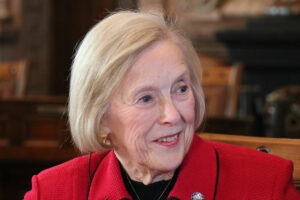
Interview of Audrey Langworthy, October 18, 2019
Interviewed by Joan Wagnon
This 2019 oral history interview of former Kansas State Senator Audrey Langworthy covers her first race to unseat long-time State Senator Norman Gaar, a race she won in 1984 and her four subsequent terms--a total of 16 years. Some of her new colleagues in the Senate steered her to the Assessment and Taxation Committee which she ultimately chaired and loved. Langworthy's tenacity comes through in the interview as she talks about the steep learning curve when she got to the Senate and to the Tax Committee. She received death threat letters after her vote on capital punishment which she sent Show Moreto the Kansas Bureau of Investigation. This interview includes an interesting discussion of strategy developed to pass the 1999 transportation plan and Langworthy's role in it. Her depiction of her views on leadership, her "personal first bill" on the Oregon Trail, and the Bi-state Cultural District bill are worth reading for insight into how Langworthy operated in the Senate and how the increase in the number of women Senators changed the culture of the Senate. Show Less
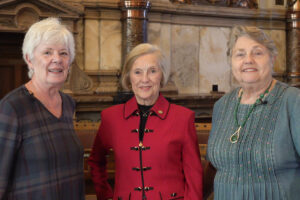
The Skirts – Conversation with former Senators Audrey Langworthy and Sandy Praeger, October 18, 2019
Interviewed by Joan Wagnon
The participants in this short Statehouse Conversation, former Kansas State Senators Audrey Langworthy and Sandy Praeger, reflect on the changes in attitudes toward women senators during their service. Three new Republican women were elected to the Senate in 1984. Because they shared an office, they frequently arrived in the Senate chamber together, causing their male colleagues to remark, "Here come the Skirts!" Langworthy and Praeger had both taught school, served on the same committees, and had also been elected to their respective city councils prior to running for the Senate. By the mid-1990's the number of women had increased significantly Show Moreso the differences were not so stark as before. Show Less

The Ladies Room – Conversation with former Senators Lana Oleen and Janis Lee, October 14, 2019
Interviewed by Joan Wagnon
The Ladies Room is a short Statehouse Conversation with former Kansas State Senators Janis Lee and Lana Oleen facilitated by former State Representative Joan Wagnon. The conversation centers around the culture of the Kansas Senate when Lee and Oleen served their first session in 1989. Altogether, eight new women Senators began their service that year. Lee and Oleen rose to leadership positions in their respective caucuses.
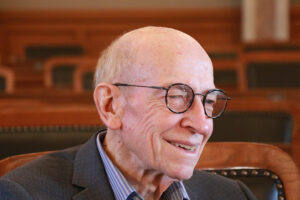
Interview of James (Jim) Maag, July 17, 2014
Interviewed by Burdett Loomis
In this 2014 oral history interview, Jim Maag reflects on his service in the Kansas House of Representatives (1969-1976) including his term as Speaker Pro Tem (1975-1976). It was a time of significant change and modernization of the Kansas Legislature and its processes. Maag provides a clear view into the evolution of the Legislature into a more professional organization. He comments on the bipartisan approaches to policymaking during that era when the urban-rural split affected the dynamic more often than purely partisan considerations. He was witness to the impact of the one person, one vote Show Morecourt case as well as the increased number of women legislators and the reduced number of attorneys. Jim's recollections draw a vivid picture of an institution in transition. His connection with the Legislature continued in his role of legislative liaison for Governor Bennett and later as a lobbyist for the Kansas Bankers Association. Show Less
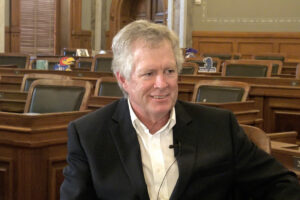
Interview of Dennis McKinney, August 23, 2019
Interviewed by Dale Goter
Dennis McKinney developed many insights in his sixteen years as a leader in the minority party into how the legislature did work, and how it should work. He recounts numerous instances when things worked well because of bipartisan cooperation and compromise. McKinney's experiences on the House Energy and Natural Resources committee working with Carl Holmes and Ken Grotewiel helped shape water policy in Kansas. His experience as a farmer and rancher in south central Kansas coupled with his focus on problem solving led to his reputation as a "middle of the road legislator" who would work Show Morewith both political sides as well as urban and rural. McKinney was committed to public education as well as conservation. The pursuit of fair and balanced tax policy shaped his actions. The interview highlights the importance of leadership from the governor's office and other legislative leaders (Mays, Shallenburger, D. Kerr, Morris). There is an interesting segment about the 2005 Special Session on school finance where McKinney talks about using the courts as leverage. The interview concludes with a brief discussion of the Greensburg tornado. Show Less
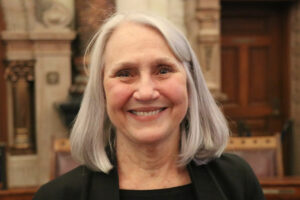
Interview of Nancy Parrish, October 23, 2020
Interviewed by Patty Clark
This 2020 oral history interview of former State Senator Nancy Parrish is packed full of information about people and policy between 1980 and 1992 in the Kansas Senate. She was one of the first, if not the first Democrat women elected to the state senate. Parrish talks about establishing her own identity after filling the unexpired part of her husband's term and winning the seat three more times while fostering a child, adopting a child, and attending law school at Washburn University. Her relationships with Republican senators allowed her to be effective in passing or shaping legislation. Show MoreParrish served on the conference committee to negotiate the 1992 school finance bill. Parrish also discussed her two years as Secretary of Revenue and working with Senator Gus Bogina to pass legislation to provide for purchase of a large-scale computer system for collecting taxes at the Department of Revenue. Parrish offers opinions on the importance of the separation of powers in the constitution, from her perspective as a former legislator, an executive branch administrator and a judge. For Parrish, each of these experiences has been a learning experience. She concludes the interview by expressing concern about the loss of "camaraderie" among legislators. Show Less
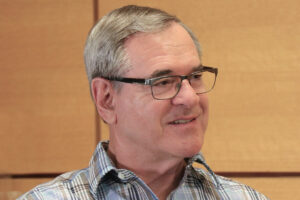
Interview of David Pope, September 19, 2020
Interviewed by Rex Buchanan
In this 2019 oral history interview, David Pope describes how the awareness of declining water levels in the High Plains Aquifers in Kansas led to efforts to support wise use and responsible management of groundwater in the state. He describes being hired to address groundwater issues from the local perspective and how he was involved in the creation the Groundwater Management District (GMD) in southwest Kansas. As Assistant Chief Engineer of the Department of Agriculture’s Division of Water Resources and later Chief Engineer, Pope was involved in a state policy limiting new groundwater development, referred to as planned Show Moredepletion, along with efforts to develop regulations on water management to replace the prior ad hoc approach. Pope discusses his dealings the U.S. Army Corps of Engineers in assuring minimal desirable streamflow to satisfy municipal and industrial water users along with conservation and recreation interests. He describes the complex interplay of surface and groundwater use policies which became a politically highly charged issue in addressing the Cheyenne Bottoms wetlands issue, Pope explains how the water law premise of "first in time, first in right" has been modified with amendments and regulations that require the filing of water rights, development of conservation plans to assure the beneficial use of water, mandatory metering of water use, and closure of areas for new water rights, all based on hydrologic studies. He concludes that although some GMDs have not tackled long-term depletion problems in western Kansas, two districts have adopted successful strategies: safe yield rules adopted by Groundwater Management District No. 2, and the creation of the Local Enhanced Management Area (LEMA) in Sheridan County to regulate irrigation. Pope describes those successes and speculates on why others have not been as successful. Show Less

Interview of Jo Ann Pottorff, October 9, 2020
Interviewed by Patty Clark
Former Kansas State Representative Jo Ann Pottorff describes her best legislative work as getting the Parents as Teachers program passed. With her background in education, she saw opportunity for this program to make a difference for children. Pottorff’s policy interests were education, financing the work of the legislature, and funding schools. In order to pursue those interests, she secured an assignment to the House Appropriations Committee early in her tenure. Over the course of her service in the Legislature her interests broadened. Pottorff was assigned to the Joint Committee on State Building Construction, which she chaired for a Show Moretime, and as a member of that Committee was involved in the renovation of the Capitol building. At the national level, Pottorff worked with National Conference of State Legislators (NCSL) and the Women's Legislative Network which allowed her to meet other women in office and to travel internationally, to Korea, Japan, Taiwan, and Germany. Pottorff describes the changes in the culture of the legislature during her years of service (1985-2012). She notes the rise in partisanship and inter-party divisions evidenced by the fact that she was often targeted in a Republican primary election when she sought renomination. Show Less

Interview of William (Bill) Reardon, August 2, 2019
Interviewed by Jim McLean
Bill Reardon is a story-teller, famous in the Democrat caucus for his jokes, stories and anecdotes, told with great enthusiasm. This entertaining interview is also filled with some of those stories. Reardon talks about how he was inspired by seeing John F. Kennedy in Kansas City and also by his brother and father, both political figures in Wyandotte County. There is an entertaining description of a hearing he chaired in the Federal and State Affairs committee on the Equal Rights Amendment in 1977. Reardon divides his legislative service into two periods—the bipartisan problem-solving work of the first 15 years, and Show Morea more ideologically driven, partisan era in the last fifteen years. His descriptions of developing and passing the 1992 school finance bill are consistent with other interviews of legislators serving at that time. Reardon tells stories about how leadership worked and discloses his observations about the Brownback years when he was serving as a lobbyist for the school district. He did end the interview with his story about a land turtle which was not transcribed because of its length, but if you see Reardon, ask him about the turtle story. Show Less

Triple Date – Conversation with former Senators Alicia Salisbury and Nancy Parrish, October 23, 2020
Interviewed by Joan Wagnon
In this short 2020 Statehouse Conversation two former Kansas State Senators, Nancy Parrish and Alicia Salisbury recall their first year serving in the Kansas Senate. In 1984 Shawnee County elected three women Senators: Nancy Parrish, a Democrat; Jeannie Hoferer, a Republican, and Alicia Salisbury, a Republican. Martin Hawver, a reporter for the Topeka Capitol Journal at that time, referred to them as a "Triple Date." Two of the three former senators discuss briefly what it was like in the Senate in 1985 when they took their seats and how they were treated by their male colleagues. Salisbury and Parrish saw Show Morewomen's issues as "people issues." Salisbury relates being removed from a conference committee on an education bill because she "did what's best for the schools she represented." Show Less
